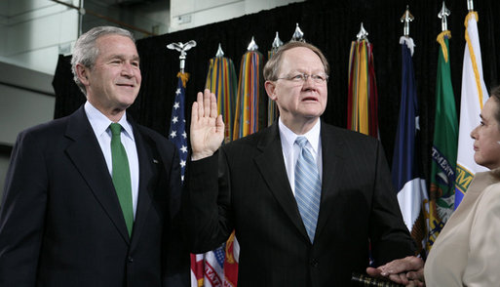Critics of the Administration’s heavy-handed surveillance practices have suggested for some time that the Administration could not be pulling off all of its warrantless and often clearly illegal techniques without the active collaboration of services providers.
Indeed, sources within the administration have now repeatedly suggested that this is why Alberto Gonzales and Andrew Card made their nighttime visit to the hospital bedside of John Ashcroft: to get his signature on a document intended to pacify service providers who were cooperating with the Administration in its surveillance programs and who recognized that in doing so they were almost certainly violating both FISA and several state statutes which make warrantless surveillance a serious felony. Several general counsel of service providers had pointed to the FISA provisions giving the attorney general authority to provide interim authorization and to the attorney general’s authority under the Judiciary Act of 1789 to craft opinions interpreting federal law. They wanted a document signed by the attorney general that said their cooperation with the Bush Administration was lawful and wouldn’t be subject to prosecution.

In a far-reaching interview with the El Paso Times, Director of National Intelligence Mike McConnell has confirmed a significant part of these suspicions. And he made a simply astonishing number of further statements—all reaching into areas which, up to this point, the Administration has insisted were highly classified national security information which could not be shared with the public, nor indeed with many members of Congress.
Some highlights from the Times own story based on the interview:
-McConnell confirmed for the first time that the private sector assisted with President Bush’s warrantless surveillance program. AT&T, Verizon and other telecommunications companies are being sued for their cooperation. “Now if you play out the suits at the value they’re claimed, it would bankrupt these companies,” McConnell said, arguing that they deserve immunity for their help.
-He provided new details on court rulings handed down by the 11-member Foreign Intelligence Surveillance Court, which approves classified eavesdropping operations and whose proceedings are almost always entirely secret. McConnell said a ruling that went into effect May 31 required the government to get court warrants to monitor communications between two foreigners if the conversation travels on a wire in the U.S. network. Millions of calls each day do, because of the robust nature of the U.S. systems.
-Offering never-disclosed figures, McConnell also revealed that fewer than 100 people inside the United States are monitored under FISA warrants. However, he said, thousands of people overseas are monitored.
The first point reflects what the Administration now calls the major open point on its FISA agenda: securing immunity for the criminal wrongdoing of individuals and corporations who facilitated its unlawful surveillance programs. The Administration has already intervened in a very heavy-handed way in state and federal court proceedings around the country, arguing that national security concerns precluded the cases going forward. In several of those cases, litigants, sometimes jointed by law-enforcement officials who are actually committed, unlike the Bush Justice Department, to enforcing the law, sought to act on statutes that preclude warrantless surveillance. The Bush Administration has failed to present a defense on the merits in any of these cases (for an obvious reason: it doesn’t have one). Instead it has relied on various formulations of the state secrets doctrine to pressure courts to dismiss the suits. McConnell is pointing to the obvious vulnerability of the collaborators in this scheme—telephone and internet service providers—whose ability to shield themselves with the state secrets doctrine is tenuous at best.
McConnell’s details on the two court proceedings is interesting on several counts. First, the Administration has insisted that all specifics about these rulings are strictly secret and cannot be disclosed. Then, of course, a prominent G.O.P. politician did just that. So by discussing them himself, McConnell is letting Rep. Pete Hoekstra, who leaked this information in an interview with the Bush-friendly New York Post off the hook. This is same-old, same-old: namely in the Bush Administration, secrets exist and evaporate as it suits the partisan political needs of the Administration on any particular day. It is distressing, but at this point no longer surprising, to see McConnell playing partisan politics with classified information. However, by doing so, he’s demonstrating that he’s a loyal member of the Bush team. Second, the Administration has insisted that the rulings and all proceedings before the FISA Court remain strictly secret. The ACLU is challenging that posture, and some of the FISA judges at this point appear to be openly skeptical about the sincerity of the Administration’s security claims, which consistently are keyed to politics, not national security interests. McConnell’s comments will make it increasingly difficult to justify keeping at least redacted copies of the court papers, including the court rulings, out of the public’s reach.

Finally, McConnell’s claims that the surveillance programs monitor fewer than one hundred people within the United States is simply, and categorically, untrue. It may be true that there are fewer than one hundred people residing in the United States who are targets of such surveillance, but the data mining operations that are used clearly affect millions of Americans, not a few dozen. McConnell is playing fast and loose with the facts or is engaged in a very creative reading of what data mining means. (Prof. Lederman parses the same statement in a typically well-crafted post this morning; I come out analytically where he does.) This remark stands right on the threshold between being cute and disseminating conscious disinformation; either way it reflects very poorly on McConnell.
One question and answer exchange from the interview is particularly revealing of the new, team-player McConnell:
Q: So you’re saying that the reporting and the debate in Congress means that some Americans are going to die?
McCONNELL: That’s what I mean. Because we have made it so public. We used to do these things very differently.
This is the crudest sort of fear-mongering. McConnell is saying that Congress, by even asking any questions about what his agency is doing, is causing people to die. Actually, this Congress that McConnell is so venomously assailing has essentially rolled over and played dead. It gave McConnell even more than he asked for, and we now know—judging by the disclosures made in the last five days in the Washington Post and the New York Times that it failed to really understand what it was giving up. What we need is a far higher level of skepticism and demands for accountability. No doubt it would be much easier for McConnell to do his job under a dictatorship, though he forgets that it is his job to uphold the Constitution and laws of the nation and to protect Americans not just from terrorists but also from the encroachments of dictatorial wannabes. It’s an appalling—and totally irresponsible–thing for a career officer to criticize Congress for oversight, especially when Congress is doing too little, not too much.
Readers of this space know that in his first few months in office, I praised McConnell for the fairness and objectivity of his public testimony. I thought he would be a nonpartisan professional voice in a vital role. And indeed, he seemed to be for sometime. The latest experiences point to a new Mike McConnell, however—one who is increasingly partisan and strident, who lacks respect for the Constitution and the law. Going forward, Congress needs to treat McConnell with caution and skepticism because he has forfeited a claim to trust.


